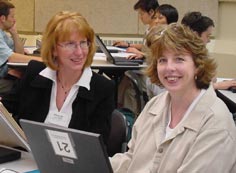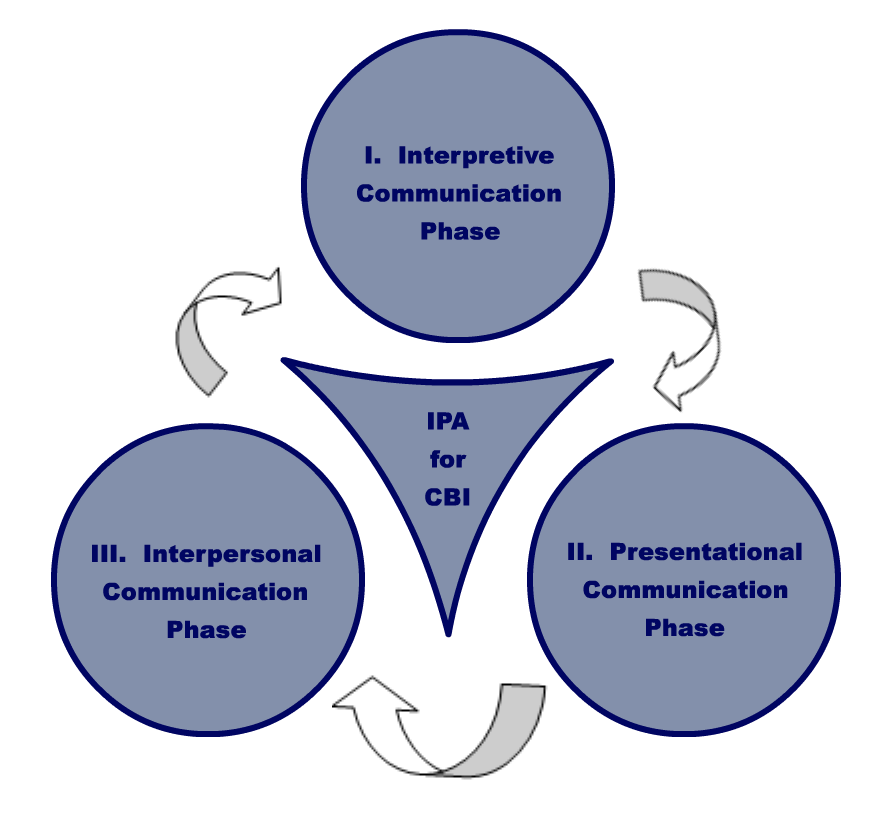 |
|
|||||

|
Example 4: Wall of the World: by Dawn Breutzman Context: The learners are kindergarten or first grade Japanese students who are at the novice-low level (ACTFL Proficiency Guidelines 1999 & 2001) in reading, writing, listening, and speaking skills. Although the students are beginners in terms of exposure to both written and spoken English, most are able to identify and write the uppercase letters of the alphabet. Many have had previous exposure to English in a private language school and are able to orally recite colors, numbers, and very basic vocabulary. The students can read and write using the Hiragana syllabary, one of the three writing systems employed in Japanese. Some may be able to read Katakana as well. All will have a base vocabulary of simple English words such as orenji (orange), boru (ball), boto (boat), etc. by virtue of the numerous loan words that now form a permanent part of the Japanese language. Instruction takes place at a small private language school in suburban Japan. Class size is kept small with a maximum of 8 students per class. Students may be of different ages, as in this case where 5 and 6-year old students learn together. The class meets once a week for 45 minutes. Each class is preceded by a 15-minute warm-up with a native Japanese-speaking instructor. The Integrated Performance Assessment (IPA) will be used upon completion of a unit entitled "I am special. You are special". The unit encompasses four lessons that emphasize recognizing and respecting what makes us all special. The content and language goals for the unit are: Content/culture goals:
Language Goals:
Three authentic texts will be used to relay the message that we all have certain abilities, likes, and dislikes. Some of these we share with others, some we don't. We can be proud of our abilities and preferences and respect the same in others. The texts I Can by Susan Winter, I Like Me! by Nancy Carlson, and It's Okay to be Different by Todd Parr, provide students with the opportunity and language to find similarities and differences among themselves in terms of abilities, personal preferences, and physical characteristics. Overview of Task: This overview of the IPA tasks will be written in the students' L1 and read aloud to the students.
The IPA tasks will be ordered as follows: Interpretive-Interpersonal-Presentational. The interpersonal task will precede the presentational task so that information obtained in the interpersonal task can be incorporated into the presentational task. The interpersonal task will require students to compare and contrast information with a partner. I would like them to incorporate this information into their final project. This will necessitate listening to and learning about the other person. I would like them to develop a slightly deeper understanding of another person and share that information with the class. This will be someone that they haven't been paired with before so they will be interacting with and learning about someone "new". One class period will be devoted to preparation and execution of the interpretive task. There will be some overlap in the presentational and interpersonal tasks, as students will work on the construction of their presentational poster while I assess pairs completing the interpersonal component. Upon completion of the interpersonal task, students will be expected to include their partner's personal information on their own poster. Thus, those that begin work on their poster before completing the interpersonal component will have to work on the "Me" and "People all over the world" parts first. As the class meets only once a week, a week will elapse between tasks. The schedule will be as follows:
To ensure that sufficient time is given to each task, the pre-class warm-up
will be omitted on these days and each class will run for 60 minutes.
References: ACTFL Proficiency Guidelines. (1999 & 2001). http://actfl.org/public/articles/Guidelinesspeak.pdf Retrieved March 6, 2005. Learning Strategies. (2002). From class handout, pp. 56-58. National Standards in Foreign Language Education Project. (1999). http://www.actfl.org/files/public/execsumm.pdf Retrieved March 6, 2005.
Navigation: Follow the IPA process or go directly to the section that is of most interest to you by clicking on the appropriate category
|
|||||
